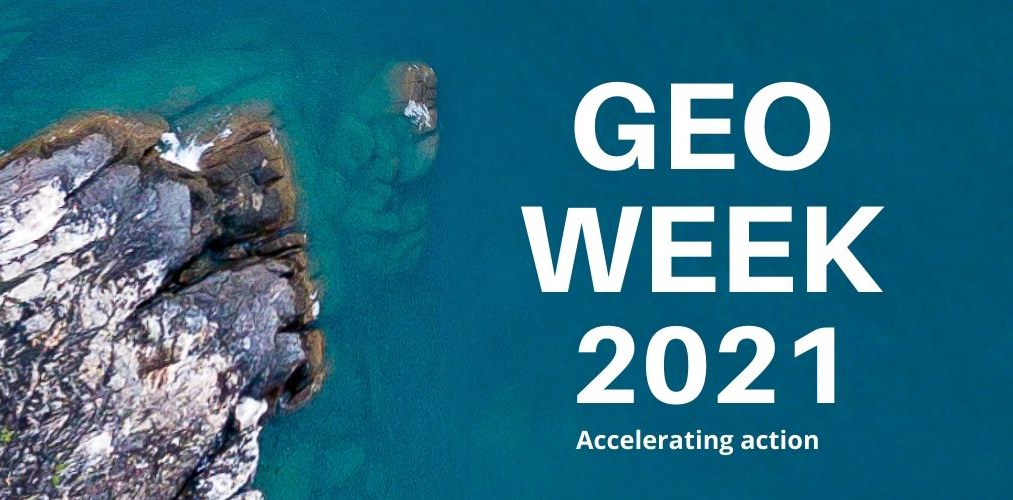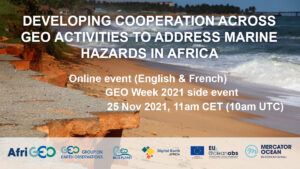The annual flagship event of the activities of the Group on Earth Observations (#GEOWeek2021) took place virtually from 22 to 26 November 2021. In the context of the packed global policy agenda on climate and environment issues, with the latest IPCC reports release, COP26, and launch of the UN Decade of Ocean Science for Sustainable Development and Ecosystem Restoration, #GEOWeek2021 is one of the most important editions. As a participating organisation of GEO, Mercator Ocean International (MOi) also hosts the European Office of GEO’s Blue Planet Initiative, the ocean and coastal arm of GEO. Read MOi’s GEO Week 2021 member statement.
#GEOWeek2021 sessions on ocean topics
Climate and Ocean anchor session
On the ocean theme, the third anchor session was dedicated to ocean and climate with Peter Thompson, the UN Secretary General’s Special Envoy for Oceans, and representatives from the Intergovernmental Oceanographic Commission of UNESCO. This session investigated what/how the activities of GEO’s Work Programme are best positioned to provide input to support country efforts to develop ocean/marine-conscious climate action, with particular focus on the UN Climate Change National Adaptation Plans. The GEO Blue Planet presentation given by its member Laura David, focused on National Adaptation Plans in the face of growing marine and coastal hazards due to climate change. The presentation highlighted the critical role of data products such as sea level trends from the Copernicus Marine Service, which MOi implements, as valuable resources.
Climate Crisis and need for Global Climate Observations
Karina van Schuckman, an oceanographer specialised in ocean climate monitoring at MOi was among the panelists in this session. This important session reviewed the global climate observing system, the progress accomplished in the last 5-10 years as well as the challenges ahead following the publication of the Global Climate Observing System (GCOS) Status Report 2021 and new science directions of WCRP. Discussions also focused on the importance of the ocean observing community (represented by the Global Ocean Observing System (GOOS)), including GOOS-UN Ocean Decade Programmes). Karina von Schuckmann provided an overview on the importance of monitoring for understanding Earth system cycles, and explained how GCOS monitors Essential Climate Variables (ECVs) of relevance to the water, energy and carbon cycle. One specific aim of GCOS is to assess ECV gaps, white spots and potential new ECVs through this Earth system approach, and the session presented three papers on each of the Earth system cycles, recently prepared under GCOS.
Developing cooperation across GEO activities to address marine hazards in Africa
On 25 November, GEO Blue Planet and MOi organised an official #GEOWeek2021 side event dedicated to developing cooperation across GEO activities focussing on marine hazards in Africa. The side event reviewed the role Earth Observations play in monitoring, preparing for, and recovering from marine hazards and what GEO can do to support the coastal aspects of the Sendai Framework for disaster risk reduction in Africa. This event also aimed at informing priorities and identifying opportunities for future collaboration across GEO activities and regional GEOs around this thematic. Speakers included experts giving local perspectives from Senegal, and the Seychelles. Representatives from AfriGEO, GEO Digital Earth Africa, GEO Human Planet, GEO Blue Planet and GEO’s Disaster Risk Reduction Working Group presented inspiring actions to address coastal hazards on the African continent. The event was hosted in the framework of the EU4OceanObs Action, which MOi implements on behalf of the European Commission, and which facilitates the EU coordination of GEO Blue Planet. For more information on this event, click here.
Mercator Ocean’s full support for GEO
Over the past 25 years, MOi has been growing and sharing its ocean knowledge and monitoring expertise with society at large focusing on the conservation and sustainable use of oceans, seas and marine resources. In essence, MOi’s work for a long time now has been inherently aligned with GEO’s vision to ensure that decisions and actions for society are informed by comprehensive and sustained Earth observation information underpinned by the principles of open data sharing on a global scale. To officialise this longstanding cooperation with GEO, MOi became a Participating Organisation of GEO in 2019. MOi reinforced this commitment in 2020 by setting up and hosting the European Coordination Office of GEO’s Blue Planet Initiative as part of the EU4OceanObs Foreign Policy Instrument Action of the European Commission. MOi was thus entrusted by the European Union to promote the Ocean and Coastal sciences to GEO and vice versa.
Today, I am proud to say that our support for GEO meets its strategic objectives to advocate the importance of Earth Observations, to engage with stakeholder communities and to deliver data, information and knowledge through all our core activities, and the programmes and services that we implement on behalf of the European Union. – Pierre Bahurel, Director General of Mercator Ocean International
In the next decade, MOi will continue to lend its full support to GEO and GEO’s strategic vision 2025 by developing and sharing ocean knowledge, integrating digital solutions into sustainable services, and engaging with society to address the challenges facing our oceans and planet.
Access GEO Week 2021 member statements
Further Resources
- Mercator Ocean International: GEO Week 2020: EU4OceanObs and New Initiatives
- EU coordination of GEO Blue Planet hosted by Mercator Ocean International


